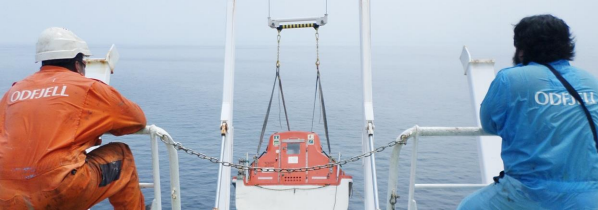George Devereese, Loss Prevention Advisor, UK P&I Club, says that personal injury is the Club’s second highest volume of claims and the most costly as well. He suggests information sharing as best practice for loss prevention, for example near miss and accident reporting should become an actual learning experience for all crew onboard. Mr Devereese explains how the UK P8&I Club promotes loss prevention across the industry and highlights that effective and direct communication with crew and members is of outmost importance.
SAFETY4SEA: What do you think is the biggest challenge for the industry loss prevention wise?
George Devereese: Sharing best practice information in a concise and relevant way that will interest and engage with today’s seafarer. At the UK Club we are looking into a number of different ways to enhance the learning experience of the seafarer, such as through crew seminars, partnerships with organisations such as the Nautical Institute, and short interactive video discussions hosted on our website.
S4S: What do you believe are the most efficient loss prevention measures? Have you realized any tangible benefits from the communication with your members so far that you would like to share?
G.D.: Speaking directly with crew and Members. We do this by conducting Risk Assessment visits aboard Members’ vessels and attending Crew Seminars, where we look at the role of mentoring for senior officers with junior officers and ratings, and the importance of risk awareness – the mantra is very much be risk aware not risk averse. We also gain important industry insight through our close relationships with leading industry organisations such as INTERCARGO & INTERTANKO.
S4S: Regarding the claims received from your members last year, which was the major contributor factor for the majority of them? Have you noticed any worrying trend during the last five to ten years?
G.D.: Personal injury and/or illness is the Club’s second highest volume of claims and the most costly. Often caused individuals taking procedural shortcuts, we put a lot of effort into communicating the importance of risk awareness at crew seminars. Our Crew Health section looks at a seafarer’s wellbeing through contract and not just at pre-employment medicals. It produces information on all aspects of a crew member’s health, be it social, emotional, intellectual or physical. We are also a co-sponsor for the Sailor’s Society Wellness at Sea initiative which will aim to address this concern head on.
S4S: What should be the key priorities for the shipping industry for strengthening safety performance onboard and ashore? What best practices would you recommend from your perspective?
G.D.: Proper and effective training of crew and shore side personnel. The expense of this training must be seen as a short-term loss to benefit the company and crew over the long-term. There must be the understanding that both half of the business, on shore and at sea, are working towards a common goal.
S4S: How does the UK P&I Club promote loss prevention across the industry? Are there any projects that you are working on right now regarding loss prevention?
G.D.: We share information by a number of ways: hard copy materials; through our website as downloadable content; through bulletins and weekly email distributions; and through Apps such as the LSA Pocket Checklist, made in conjunction with Lloyd’s register. This app enables you to view necessary legislative and regulatory requirements, save multiple checklists, check off completed activities, add essential notes/images and send the completed checklists via email, and through videos. We are working on a number of ‘Risk Focuses’ which detail risks we have seen in recent claims handled by the Club which are distributed to Members as hard copies and are available through the website to download. We are also working on a number of short videos to be hosted on our website dealing with trending issues within the maritime community.
S4S: What are your suggestions to industry stakeholders to enhance effectiveness of loss prevention best practices?
G.D.: Do not fear near miss and accident reporting but embrace it as a learning experience. Understand that cultural differences exist aboard vessels, and that there is a need to use alternative managerial styles to allow for the best performance of the crew. The role of senior officers mentoring and training juniors cannot be over exaggerated in this.
The views presented hereabove are only those of the author and not necessarily those of SAFETY4SEA and are for information sharing and discussion purposes only.
[divider]
 George Devereese is a Loss Prevention Advisor at UK P&I Club. George is ex Royal Navy with a certificate of competency equivalent to that achieved in the Merchant Navy and has extensive ship handling experience in a number of RN hull types. He is qualified as Company Security Officer, ISM, ISPS & ISO 14001 lead auditor and prior to joining UK Club was employed as deputy safety and security manager. Club’s loss prevention department has the aim of reducing the Members’ exposure to claims by raising awareness of risk, publishing loss prevention materials and statistics, and illustrations of how claims may be avoided. Publications issued by the department include the Major Claims Analysis, Loss Prevention News and Carefully to Carry. Videos are regularly produced.
George Devereese is a Loss Prevention Advisor at UK P&I Club. George is ex Royal Navy with a certificate of competency equivalent to that achieved in the Merchant Navy and has extensive ship handling experience in a number of RN hull types. He is qualified as Company Security Officer, ISM, ISPS & ISO 14001 lead auditor and prior to joining UK Club was employed as deputy safety and security manager. Club’s loss prevention department has the aim of reducing the Members’ exposure to claims by raising awareness of risk, publishing loss prevention materials and statistics, and illustrations of how claims may be avoided. Publications issued by the department include the Major Claims Analysis, Loss Prevention News and Carefully to Carry. Videos are regularly produced.






























































